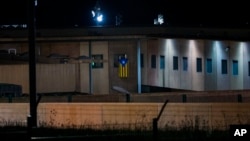A farm tractor with a crane lifts up half a dozen people holding Catalan independence flags in northeast Spain, trying to get high enough so they can peek into a prison courtyard and see their separatist heroes.
The distance makes it hard to recognize the faces of the Catalan activists and politicians jailed in the Lledoners penitentiary while they await trial for their involvement in a banned independence referendum last year in Catalonia. But inmates and supporters make a quick connection.
Shouts of "Freedom!" and "We want you home!" from outside are met with "We want to be out!" coming from the prison. And joy erupts when the unofficial Catalan flag embraced by secessionists, the "estelada," appears through the bars of a cell window.
"I'm convinced that the energy we send them from here helps them," said Quima Albalate a 58-year-old nurse who joins her son for twice-a-week picnics of solidarity in these quiet hills of rural Catalonia.
Jailed Catalan separatists, together with those who fled abroad to avoid prosecution by Spain, have become an emotional symbol of what many perceive as Spain's heavy-handed attempt to crush the independence movement in Catalonia. They are also a key stumbling block in negotiations trying to find a way out of the political deadlock, Spain's worst constitutional crisis in decades.
Their absence casts a shadow over Thursday's commemorations of the first year since Spanish police began searching regional government buildings in Barcelona and arresting Catalan officials.
Nine of the separatists remain in preventive jail on preliminary charges of rebellion and abuse of power. Seven are in Lledoners, including prominent activists Jordi Sanchez and Jordi Cuixart, who drew tens of thousands to the streets one year ago to protest police searches ahead of Catalonia's banned October 1, 2017 referendum on independence.Former regional ministers Oriol Junqueras and Jordi Turull are also here.
The latter's wife, Blanca Bragulat, stood this week outside the prison's walled perimeter and put her husband on speakerphone for supporters.
"We're OK, we are strong," Turull said, replying to questions by friends and relatives who applauded when they heard his voice.
Holding Catalan independence flags and wearing yellow t-shirts and ribbons — ubiquitous symbols of support for those they consider to be political prisoners — these families have been setting up the picnic tables twice a week ever since the inmates were transferred from prisons near Madrid to this facility 70 kilometers(43 miles) north of Barcelona.
The transfers were ordered by Spanish Prime Minister Pedro Sanchez soon after he came to power in June to ease the political conflict. But regional separatist authorities in Catalonia want more and are urging state prosecutors to change their position and allow the release of the prisoners.
The central government, which appoints the top prosecutor, is sticking to the line that the separatists are receiving due process according to Spanish law. But some officials have acknowledged that dialogue would be easier with the Catalans out of jail.
Foreign Minister Josep Borrell, a politician from Catalonia who presided over the European Parliament, recently said "at a personal level" he would have preferred for the separatists to be free while awaiting trial. That comment was mirrored by Territorial Affairs Minister Meritxell Batet, another Catalan in Sanchez's cabinet, who said "it would be better and much easier for the dialogue" if the Catalans were free.
For separatist parties in the prosperous region, however, the prisoners keep pro-independence supporters united, says political analyst Pablo Simon.
"For a highly fragmented Catalan movement that scrambles to find the next step in the fight for independence, the prisoners' plight is their only source of cohesion currently. But the politicians are in the hands of activists who think that with jailed separatists there can't be any compromise with central authorities," said the Carlos III University professor. "There's very little room to maneuver."
Meanwhile, divisions over the issue of independence are still running high in the streets of Catalonia. Some people have objected to using public spaces to hang symbols in support of the prisoners.
For separatists — but also for some of those who don't support a separate Catalonia — the jailing of the officials without even setting a date for a trial feels like a deep injustice.
"We need the higher courts to look at us here and see that these people defended political ideas," said Albalate, the nurse. "But that's not a reason for them to be in jail."
Bragulat said she hoped "the European Community at some point will say something."
But even Europe seems unmoved by the Catalan separatists' plight.
Council of Europe Secretary General Thorbjorn Jagland told reporters this month that he "had no doubt Spanish courts were treating the matter in accordance with Spanish law and the European Human Rights convention." He said the separatists could appeal their case in the European human rights court but only after they had gone through courts in Spain.
That's a bleak prospect for supporters and relatives like Bragulat, who told The Associated Press she has "gotten used to living day by day" in order to cope with her husband's absence.
"We don't know how long all of this will last," she said. "But it will end well, right?"




